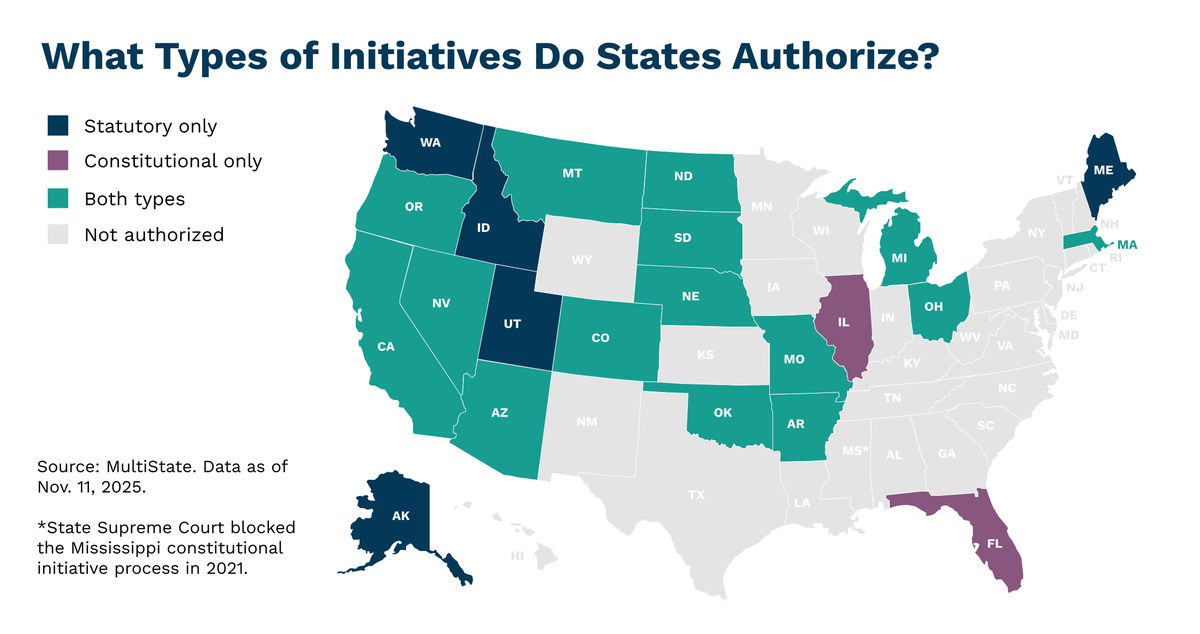
Elections & Campaigns
Record-Breaking Wisconsin Judicial Election Delivers Major Confidence Boost to Democrats (Court Report)
April 11, 2025 | Sandy Dornsife
February 18, 2025 | Bill Kramer
-3c5a54-1200px.jpeg)
Key Takeaways:
Ballot measures are such a unique part of the state policymaker process, and we've seen an increasingly aggressive battle between legislatures and voters over the power of citizen-initiated ballot measures.
Currently, 22 states allow their citizens to place statutes or constitutional amendments before the voters, bypassing the legislature.

Last year, Utah was the center of a major skirmish when the state supreme court ruled that lawmakers couldn’t unilaterally repeal a ballot measure, passed by voters in 2018, to set up an independent redistricting commission of its original intent. The court cited a provision of the state constitution giving the people of Utah the right to “alter or reform their government as the public welfare may require.” While the court’s decision was narrow and didn’t even reach a decision on the merits of whether the maps drawn by lawmakers instead of an independent commission were valid, the decision set off a firestorm in the legislature.
Furious lawmakers quickly called themselves into special session and passed legislation to place before the voters a constitutional amendment explicitly giving the legislature authority to rewrite voter-approved ballot measures or repeal them entirely. But the courts threw the measure off the ballot, calling the description voters would see (stating simply that the measure would “strengthen the initiative process”) as “counterfactual.”
Not deterred, lawmakers have returned to the new legislative session in Utah with novel ideas to thwart citizen-initiated ballot measures. Late last month, the Senate passed legislation (UT SB 73) that would require any citizen-initiated ballot measure to publish the full initiative text in at least one physical newspaper in every county of the state continuously for the two months before the election. This mandate alone is expected to add $1.4 million to the cost of getting a ballot measure onto the ballot in Utah. The legislation would further require initiative backers to pay for a full fiscal analysis of the measure’s impact and identify specifically which government programs would be cut or what taxes would need to be levied to pay for any fiscal changes. Finally, the bill would broaden the lieutenant governor’s discretion to reject a citizen-initiated statute for the ballot if, in their opinion, the ballot measure is “unconstitutional” or if the funding description is “unlikely to provide adequate funding.” We’ve witnessed a growing trend of statewide officeholders rejecting ballot measures for minor procedural reasons.
Utah was the second state to enact an initiative process for its citizens. But legislative meddling to block this constitutional right has a long history in Utah. Lawmakers failed to pass legislation implementing the initiative process until 1916 and even then it included such specific requirements to make the initiative impossible to use. For instance, anyone who wanted to sign an initiative petition needed to do so “in the office and in the presence of an officer competent to administer oaths.” It wasn’t until 1960, after these restrictions were loosened, that voters in Utah finally approved an initiative statute. Since then, a total of only seven citizen-initiated statutes have been approved by voters, including three in 2018.
And if lawmakers in the Beehive State have their way, those low numbers will likely continue.
This article appeared in our Morning MultiState newsletter on February 11, 2025. For more timely insights like this, be sure to sign up for our Morning MultiState weekly morning tipsheet. We created Morning MultiState with state government affairs professionals in mind — sign up to receive the latest from our experts in your inbox every Tuesday morning. Click here to sign up.

April 11, 2025 | Sandy Dornsife

April 4, 2025 | Bill Kramer

March 13, 2025 | Sandy Dornsife